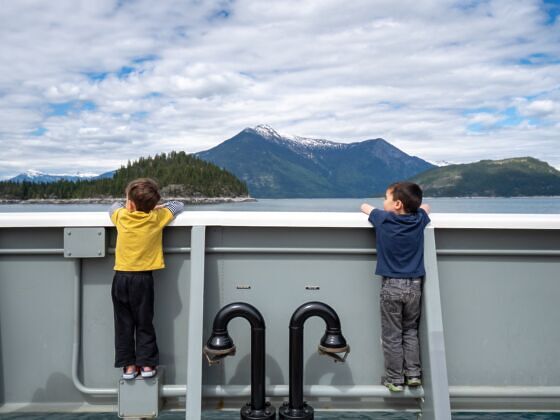I AM SITTING on a ferry in New Zealand, moving from the North Island to the South Island. Across from me, an old man who resembles the Gorton’s Fisherman is eating a cold potato with his bare hand. He catches me studying him and offers a bearded smile. I shyly return it, then look back to my book.


Another interaction with a stranger.
As a child growing up in the suburbs outside LA, I was told to avoid strangers. I was supposed to be wary of their presence in empty parks and resist their tempting offers of puppies and candy on the streets. As I got older I learned how to treat strangers based on what I wanted at the time. How to smile at a waiter to get free refills or score notes from the girl in front of me for a lecture I missed last week. Selfish, really.
The more I travel, the more I challenge this selfishness. In an unfamiliar country, strangers offer a glimmer of kindness and hope. I take in their voices, faces, and smells as a newborn would — curious, skeptical, and, oftentimes, in comfort. Outside of my bubble at home, it’s the strangers who teach me about life. They humble me and teach me about compassion.
As a laid-back and often quiet California girl, up to now I have done just fine in life by observing, listening, and letting the world come to me. Now, though, I am in a new country. I must go to the world for answers and friendship.
Through traveling, I’ve discovered how chatty I can be and how much I question. The feeling of freedom I get from boarding a 13-hour flight for the first time releases my inhibitions and the former fences I’ve built between strangers and myself. Suddenly, this “stranger-hood code” I have followed all my life — distancing and distrusting outsiders — disappears into the atmosphere over the Pacific Ocean. I emerge from my comfort zone and greet the unknown.
*****
Outside on the ferry deck, I stand among other travelers, photographing the snowy mountains on the horizon and the rough coastline, with its green hills that I playfully imagine were sculpted by God’s hands from large mounds of clay. This landscape itself is a stranger to me, with its own stories to tell.
It’s foggy and cold on that winter afternoon in June, and as the ferry moves through the drowned river valley of Queen Charlotte Sound, tiny islands emerge from the mist into my view, then disappear again as we pass by. They remind me of everyone I encounter as I travel, appearing in my life and reshaping my notion of strangers. They do this in ways I often underestimate until they’ve left me.
I clutch the slippery railing with one hand and my camera with the other, letting the wind propel my loose hair into dangerous tangles. A young German man is lingering nearby, cradling a big digital SLR camera. He is blonde and boyish, with glasses that give him a nerdy edge. I speak first.
“It’s beautiful here.”
“Yes, yes,” he says, peering out onto the horizon. “Can’t capture it completely with a photo.”
He introduces himself and we chat on the ferry deck, the strong winds often stealing the ends of sentences, causing me to shout, “What did you say?” several times.
This is his third time in New Zealand. He fell in love with this country the first time he visited, and he and his girlfriend are on a backpacking trip through both islands. I learn all this in a matter of seconds. Funny how fast a stranger can become an acquaintance.
“You must visit again in summer,” Marcus tells me. “The South Island is completely different. It seems like another country altogether.”
Tiny lights appear on the horizon. We are getting closer to the port town of Picton, where the ferry departs. A thin spray of sea mist covers my face and angry gusts push against the boat now, nearly knocking me over.
“Better get inside,” Marcus advises, squinting behind his glasses towards the wind.
As we move toward the heavy metal door, I say, “Maybe we’ll meet again during our travels.” He smiles and wishes me a good trip.
I never saw Marcus again. He emerged as an island in the fog, made me smile, and watched me move right along.
COMMUNITY CONNECTION
Putting trust in the kindness of strangers is one of Tim Patterson’s 10 Travel Risks Worth Taking.